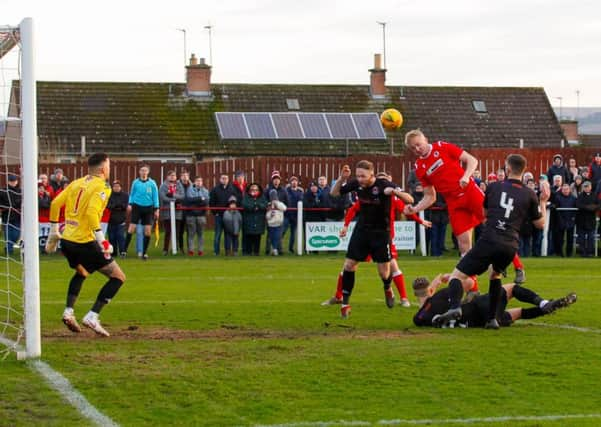Bonnyrigg Rose 0-1 Clyde: All about Love in Bonny and Clyde romance


But is it possible to over-romanticise the Scottish Cup tale of Bonny and Clyde, the Bully Wee and the properly diminutive team from the old mining town with the flower in their name? Clyde with their 1950s triumphs and ambushing of Roy Keane and Bonnyrigg Rose Athletic attempting to achieve fifth-round bliss for the very first time?
OK, so Bonnyrigg emerging victorious in the gathering gloom would have been more romantic. “This love will last for ever” proclaimed a banner behind the goal the Lowland Leaguers battered lustily in an engrossing second half. But at the other end with ten minutes remaining it was substitute Ally Love, inset, who squeezed home the winner for Clyde.
Advertisement
Hide AdAdvertisement
Hide AdAt the final whistle the League One side’s manager Danny Lennon looked bedraggled and relieved. He paid warm tribute to Bonnyrigg and admitted he would cheerfully have taken a replay.
But maybe Bonnyrigg deserved even more than that. Four times in the second period goalkeeper David Mitchell produced a top save to deny the “Rosey Posey”. The home fans jammed into the snug ground groaned. They hollered in vain for a penalty when the ball pinged off Scott Rumsby’s hand. “The ref told me it was handball,” said Rose manager Robbie Horn, “but that it wasn’t deliberate.
“We’re very disappointed. My players put so much into the game and I couldn’t have asked any more of them. Mitchell’s produced some great saves and their goal comes off the post. That wee bit of luck deserted us but I don’t think you could tell there were two divisions between these sides. Clyde’s celebrations tell you they were delighted – good luck to them.”
Clyde’s successes of 1955 and 1958 were a long time ago, but in a nice touch the Bonnyrigg match programme evoked the cartoon front cover from the latter victory against Hibernian, a gleeful throng of trilbys, puffing pipes and rosettes. At one stage – low winter sun glinting – a trilby or any hat with a brim might have been useful. More useful still? A periscope.
New Douglas Park has a wonderfully wonky slope, one side to the other, and Lennon in his dugout must have struggled to follow play on the upper level. Spectators on the other flank must have wondered if Gregg Wylde had fallen down a hole, such was his inconspicuousness.
Wylde, the one-time Ranger, was a name. A bigger one was David Goodwillie but the striker with a past struggled to make any impact. They say the cup can be a great leveller when a bigger team journeys to the home of a smaller one and maybe it would have helped Clyde’s cause if the pitch had been level. But maybe it would have helped Goodwillie’s cause if he hadn’t been marked by man-of-the-match Alan Horne.
The programme acclaimed Horne as “the Tranent Pele” but Beckenbauer would be more accurate. Similar to the bold Franz, he turned defence into attack elegantly, or as elegantly as the treacly surface would allow, by first nicking the ball off his more celebrated – and notorious – opponent by stealth and then swaggering upfield.
Early on full-back Jonathan Brown’s surges caught the eye, as did the rumbustious strike-play of George Hunter. Bonnyrigg know every bump and incline of their park and Clyde struggled. At the change of ends their fans taunted Rose goalie Mark Weir about him carrying some timber, but the keeper was pretty much a spectator as Mitchell saved from Keiran McGachie, Lee Currie twice and Ewan Moyes, the stop from the latter’s header being hailed by Horn as “fantastic”.
Advertisement
Hide AdAdvertisement
Hide AdLennon had to make changes, among them Love. A header which finally brought Weir into action gave warning and then came the replacement’s goal, a reward for doggedness in the box after some miscontrol.
“It was a brilliant tie, full of the romance of the cup and we were just hoping the romance wasn’t going to be against us,” said Lennon. “We knew this was going to be a real, real tough challenge. We’re delighted to be in the next round but big credit to Bonnyrigg, this has been a wonderful journey for them.”